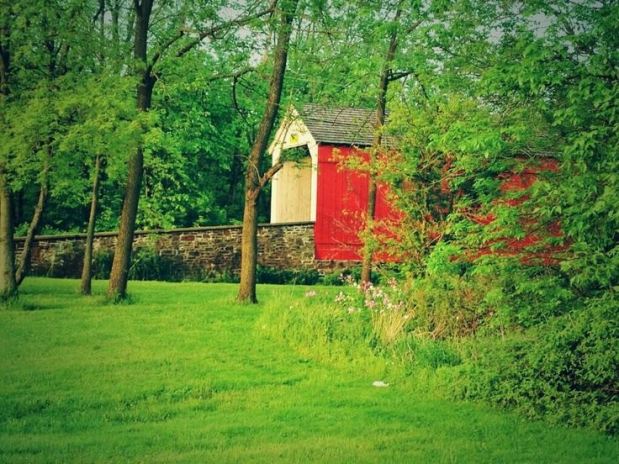I’m back to that stage of wanting to write, but scared I won’t finish. Actually, I haven’t even started it. I’m just working on the preliminaries right now. I could bog down on any number of preliminary steps. I’m just getting the basic story line in my mind. I’m starting the historical research on the area I want to write about, and the time period I want to feature. I picked the area that I grew up in: mostly because it’s an area I loved, and is rich in the period of history I’m concentrating on… I also thought that would make the research easy: ummmmm, “NO”, it doesn’t!
My story is set in the Revolutionary war, and is based in Bucks County. Buildings that I thought existed back during the Revolutionary war? I’m finding quite a few weren’t there until 1790 or 1800. DANG!! Next question: how many Germans lived in the region of Newtown (a town established at the exact same time as Philadelphia)? Now: I was *pretty* sure I knew my area’s history; well, I do…. but not *quite* as well as I thought I did <rueful smile>. In the process of this exploration, I discovered that Newtown was the county seat of Bucks County during the period of the Revolution; the county seat didn’t get moved to Doylestown until well after the Revolutionary war. Surprise, Surprise!! All the years I lived there (or just over the Delaware in central N.J.), I never realized that. One never stops learning… luckily. And I still haven’t found out how many Germans lived in the Newtown/Churchville/Richboro area.
Next I’ll need to come up with a heroine and hero whose background stories are plausible. They’re both going to be German… There were an amazing number of Germans in Pennsylvania during the 18th century. I discovered, when I moved to Winston-Salem, that many of the Germans who had come to Pennsylvania in the early 1700s moved down to the Winston-Salem region in the 1750s — because (get this) they thought it was getting too crowded in Pennsylvania. What did they consider crowded?!?!?.
My own family has roots going back to the Lancaster area (at the time, still part of Chester County), as early as 1710. By the way: not all Germans who moved to Lancaster were (or are) Amish). One part of that branch of my family was Swiss Mennonite, but the rest were Lutheran, or some might have been Reformed. Another part of the family came the year that the U.S. Constitution was signed. This was on my father’s mother’s side of the family. My father’s father’s side didn’t come until 1892.
One part of my mother’s family came in the mid-late 19th century from what was then the Grand Duchy of Hesse; another part came from Swabia (part of Bavaria). I just learned, while doing research for this story, that my father’s paternal Grandmother came from the same region as my mother’s father’s family. I had learned a few years ago, from looking at the map of Germany, that my paternal grandfather’s half-brother (my great-granduncle on my dad’s side) lived in a town that was just a few miles north of the town where my mother’s grandfather came from. Family trees can be VERY interesting! I seems I have Hessians (or Rhineland Palatinates) on both sides of my family.
Another piece of information that I discovered over the past few months, that actually started the seeds of this story, was that some Hessian mercenaries fighting with the British deserted to the colonists’ side. George Washington actually made an offer that any Hessian soldiers who came over to the colonists’ side would receive 50 acres of land. The Germans knew a good deal when they saw one, and some decided that good farming land was worth the chance of getting shot for desertion (by the way: some British soldiers did the same).
Sometimes the Hessians who were captured and hired out as “prison labor” to the local farmers and tradesmen decided that they liked the freedom and peace that the Germans already living there enjoyed; therefore, they decided to stay in what became the United States. My story is going to be based on one of these Hessian soldiers… not an actual historical person, but one who could have realistically made this choice. He’ll fall for a young woman whom he meets as he is switching his allegiances. This is all the further I have gotten. I have a name for the hero, but not yet for the heroine. I’m still working on the possible scenerios, depending upon what I uncover in my historical research.
By the way: don’t expect this to be “steamy”; even my very proper mother thought I was a prude when it came to reading romantic stories:-)! Just warning you now!
It won’t be overtly Christian, but since I’m a Christian, it will certainly find it’s way bubbling out through the story…. Of that I am sure!
Well, I just learned that I won’t need to find out how many Germans lived in the Churchville area in the 18th century. There was NO Churchville in the 18th century. Checking on the National Historic Register website for Churchville in Northampton Township, I find that Churchville did not exist as such. In the 18th century, it was a tiny village on the crossroads called Smoketown. More details to follow, as I learn them myself. Oh, and Richboro was Richborough…
Just don’t hold your breath for me to finish this; I don’t want anyone to pass out waiting for me to actually finish a romantic story <rueful smile>… or if I do, I never seem to find a way to get it published….

